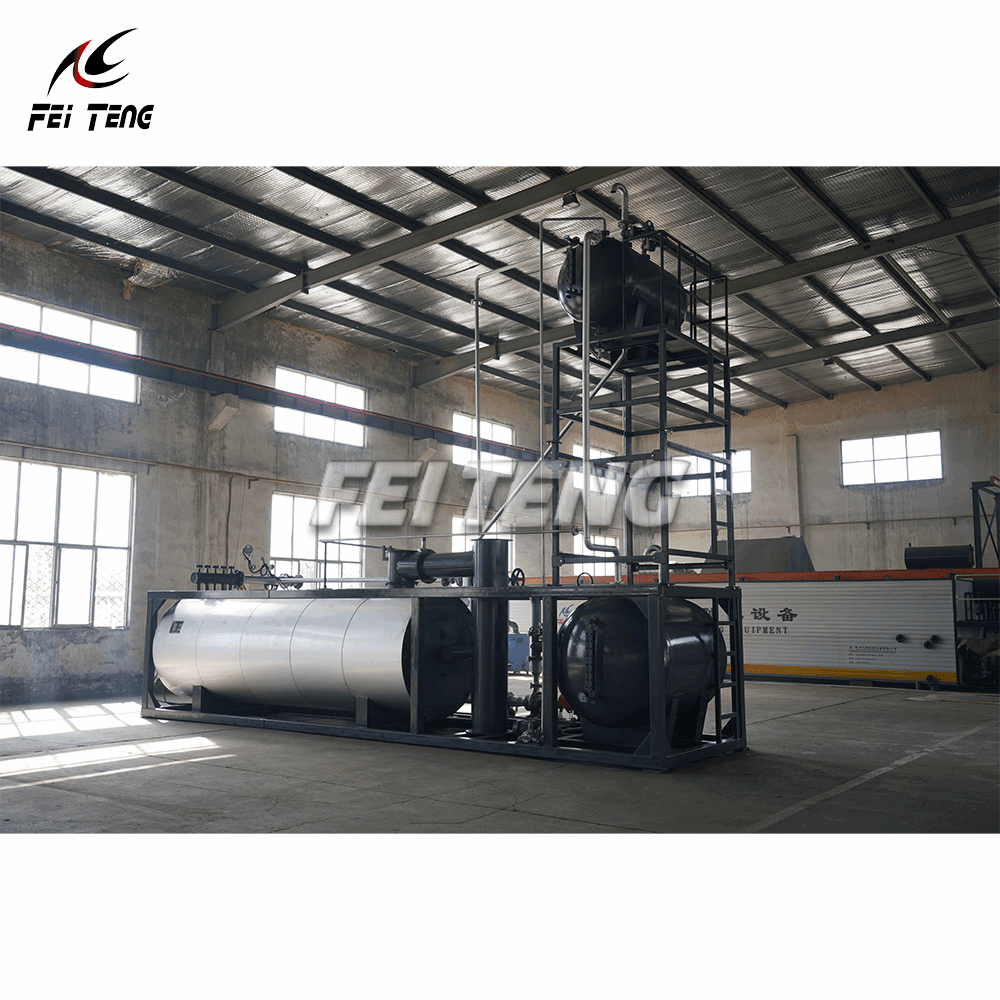
Lò dầu nhiệt |FEITENG
GerryJarlShare
I. Nguyên lý hoạt động
Nguyên lý hoạt động của lò hơi dầu nhiệt chủ yếu dựa trên nhiệt độ cao và hiệu suất truyền nhiệt của dầu nhiệt. Các quy trình cụ thể bao gồm:
- Sưởi ấm : Đầu đốt trong lò dầu nhiệt truyền nhiệt sinh ra từ quá trình đốt nhiên liệu (như than, dầu, khí) sang dầu nhiệt trong bộ trao đổi nhiệt (còn gọi là lò hoặc buồng đốt).
- Trao đổi nhiệt : Dầu nhiệt được đun nóng trong bộ trao đổi nhiệt, làm tăng nhiệt độ của dầu. Bộ trao đổi nhiệt thường là một hệ thống đường ống, nơi dầu nhiệt chảy qua và trao đổi nhiệt với khí đốt nhiệt độ cao trong buồng đốt.
- Tuần hoàn : Dầu nhiệt đã được làm nóng được bơm ra khỏi bộ trao đổi nhiệt và sau đó được tuần hoàn trở lại bộ trao đổi nhiệt, tạo thành một chu trình dầu nhiệt. Điều này duy trì nhiệt độ và hiệu ứng truyền nhiệt của dầu nhiệt.
- Truyền nhiệt : Dầu nhiệt được đun nóng được vận chuyển qua đường ống đến thiết bị hoặc quy trình cần gia nhiệt. Trong thiết bị hoặc quy trình, dầu nhiệt truyền nhiệt thông qua trao đổi nhiệt, làm tăng nhiệt độ của môi chất (như không khí, nước, hơi nước, v.v.).
- Kiểm soát : Lò dầu nhiệt thường được trang bị hệ thống kiểm soát để theo dõi và kiểm soát các thông số như nhiệt độ, áp suất và lưu lượng dầu nhiệt, đảm bảo nhiệt độ ổn định và vận hành an toàn bên trong lò.

II. Đặc điểm sản phẩm
Tiết kiệm năng lượng và hiệu quả năng lượng: Lò hơi dầu nhiệt có thể đạt được nhiệt độ làm việc cao dưới áp suất thấp, với tổn thất nhiệt tối thiểu, mang lại hiệu quả tiết kiệm năng lượng đáng kể. Hoạt động ổn định: Dựa trên khái niệm tuần hoàn cưỡng bức, lò hơi dầu nhiệt có thể đạt được khả năng kiểm soát chính xác cao đối với hoạt động của môi trường. Hiệu suất môi trường tốt: Lò hơi dầu nhiệt không tạo ra các chất ô nhiễm như khí thải và nước thải trong quá trình vận hành, đáp ứng các yêu cầu bảo vệ môi trường. Tuổi thọ cao: Hệ thống sưởi vòng kín giao tiếp với khí quyển, kéo dài tuổi thọ của lò hơi. Phạm vi ứng dụng rộng: Lò hơi dầu nhiệt không chỉ phù hợp cho các quá trình xử lý nhiệt trong sản xuất công nghiệp mà còn được ứng dụng trong thực phẩm, dược phẩm và các ngành công nghiệp khác vì dầu nhiệt không làm hỏng các thành phần dinh dưỡng của nguyên liệu.
III. Lĩnh vực ứng dụng
Ứng dụng của lò hơi dầu nhiệt rất rộng, bao gồm nhưng không giới hạn ở:
- Công nghiệp hóa chất : Được sử dụng để chưng cất, bay hơi, sấy khô, cách nhiệt, nấu chảy và các quá trình khác.
- Ngành công nghiệp nhựa và cao su : Dùng để ép nóng, đùn, nhào, tinh luyện đặc, gia nhiệt và cách nhiệt khuôn mẫu.
- Ngành công nghiệp in nhuộm dệt may : Dùng để nhuộm, sấy, hồ, in nhuộm, ủi, dệt sợi hóa học.
- Ngành chế biến thực phẩm : Được sử dụng để xử lý chín các sản phẩm bột, chiên ở nhiệt độ cao các sản phẩm đậu nành và khử trùng ở nhiệt độ cao các sản phẩm thịt.
- Ngành sản xuất giấy : Được sử dụng để đun nóng và hòa tan hóa chất, cô đặc nước đen và tạo thành bột giấy.
- Ngành vật liệu xây dựng : Dùng để gia nhiệt nhựa đường, hòa tan và điều chỉnh nhiệt độ gia nhiệt của nhựa đường nhũ tương.
- Công nghiệp hóa chất dầu ăn : Được sử dụng để phân hủy chất béo và dầu, phản ứng hydro hóa, cô đặc, chưng cất, v.v.
- Ngành công nghiệp gỗ : Dùng để ép nóng và sấy gỗ.
IV. Ưu và nhược điểm
Thuận lợi:
- Độ an toàn cao : Áp suất làm việc thấp, tránh nguy cơ nổ hơi nước áp suất cao.
- Hiệu suất nhiệt cao : Trạng thái chảy ổn định của môi trường dầu và hệ số truyền nhiệt cao, tận dụng tối đa năng lượng.
- Vận hành đơn giản : Thiết bị đơn giản, dễ vận hành và bảo trì.
- Thân thiện với môi trường và tiết kiệm năng lượng : Giảm thiểu thất thoát nhiệt, không tạo ra các chất gây ô nhiễm như khí thải và nước thải.
Nhược điểm:
- Chi phí vận chuyển và bảo trì cao : Cần có phương tiện vận chuyển dầu chuyên dụng.
- Khó khăn trong kiểm soát rủi ro : Cần kiểm soát chặt chẽ nhiệt độ dầu để ngăn ngừa tai nạn an toàn như hỏa hoạn.
- Khởi động và tắt máy chậm : Chu kỳ khởi động và tắt máy dài hơn.
- Rò rỉ dầu gây ô nhiễm môi trường : Khi xảy ra rò rỉ, nó sẽ gây ô nhiễm môi trường và đòi hỏi phải dọn dẹp và xử lý tốn kém.
Tóm lại, lò hơi dầu nhiệt đóng vai trò quan trọng trong nhiều lĩnh vực công nghiệp nhờ nguyên lý hoạt động và ưu điểm độc đáo. Tuy nhiên, cần cân nhắc kỹ lưỡng những nhược điểm và rủi ro tiềm ẩn khi lựa chọn và sử dụng.




